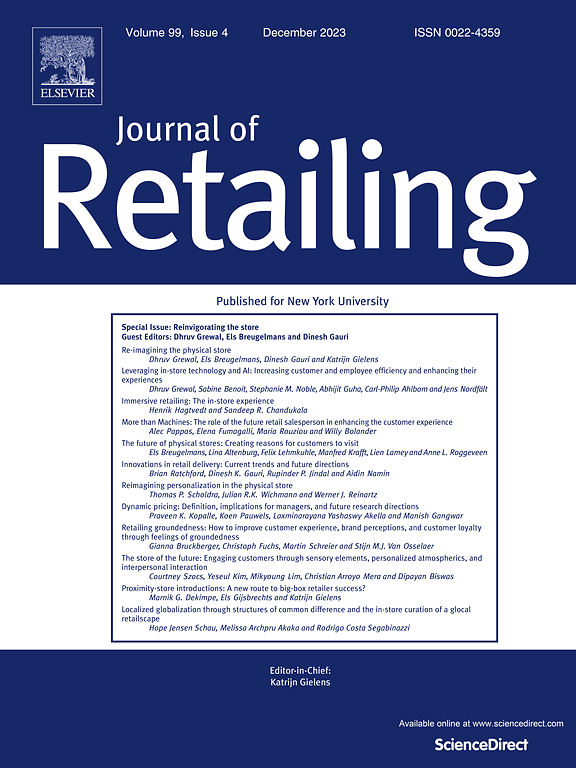不能碰这个:形式现实主义和产品领域在虚拟网红代言中的影响
IF 10.2
1区 管理学
Q1 BUSINESS
引用次数: 0
摘要
虚拟代理在各个领域的流行导致社交媒体平台上出现了虚拟影响者,作为计算机生成的替代人类社交媒体影响者。本研究通过考察虚拟网红的形式现实主义及其与产品领域的互动,揭示了影响虚拟网红在品牌代言中的有效性的因素。四个实验表明,虚拟网红的形式现实性和他们代言的产品的领域(物理和非物理)影响了虚拟网红作为品牌代言人的有效性。具有高形式现实性(相对于低形式现实性)的虚拟网红会对品牌产生更积极的态度。驱动这种效应的潜在过程是,与具有高形式现实感的人相比,具有低形式现实感的虚拟影响者感知到缺乏近端感官能力。重要的是,当虚拟影响者认可属于非物理(与物理)领域的产品时,品牌对高(与低)形式现实性的态度没有差异,其中虚拟影响者的近端感官能力不太突出。本研究通过研究品牌背书背景下的新兴影响者类型,为文献做出了贡献。这项研究也为零售商选择合适的影响者和制定有效的代言活动提供了实际意义。本文章由计算机程序翻译,如有差异,请以英文原文为准。
Can(’t) touch this: The effect of form realism and product domain in virtual influencer endorsements
The prevalence of virtual agents across various domains has led to the emergence of virtual influencers on social media platforms as computer-generated alternatives to human social media influencers. This research sheds light on the factors that influence virtual influencers’ effectiveness in brand endorsements by examining their form realism and its interaction with the product domain. Four experiments show that virtual influencers’ form realism and the domain (physical vs. non-physical) of the products they endorse affect virtual influencers’ effectiveness as brand endorsers. Virtual influencers with high (vs. low) form realism generate a more positive attitude toward the brand. The underlying process driving this effect is the perceived lack of proximal sensory capabilities of virtual influencers with low form realism compared to those with high form realism. Importantly, there are no differences in brand attitudes for high (vs. low) form realism when virtual influencers endorse products belonging to non-physical (vs. physical) domains, where the proximal sensory capabilities of virtual influencers are less prominent. This research contributes to the literature by examining an emerging influencer type within the brand endorsement context. This research also offers practical implications for retailers regarding selecting the right influencer and crafting effective endorsement campaigns.
求助全文
通过发布文献求助,成功后即可免费获取论文全文。
去求助
来源期刊

Journal of Retailing
BUSINESS-
CiteScore
15.90
自引率
6.00%
发文量
54
审稿时长
67 days
期刊介绍:
The focus of The Journal of Retailing is to advance knowledge and its practical application in the field of retailing. This includes various aspects such as retail management, evolution, and current theories. The journal covers both products and services in retail, supply chains and distribution channels that serve retailers, relationships between retailers and supply chain members, and direct marketing as well as emerging electronic markets for households. Articles published in the journal may take an economic or behavioral approach, but all are based on rigorous analysis and a deep understanding of relevant theories and existing literature. Empirical research follows the scientific method, employing modern sampling procedures and statistical analysis.
 求助内容:
求助内容: 应助结果提醒方式:
应助结果提醒方式:


